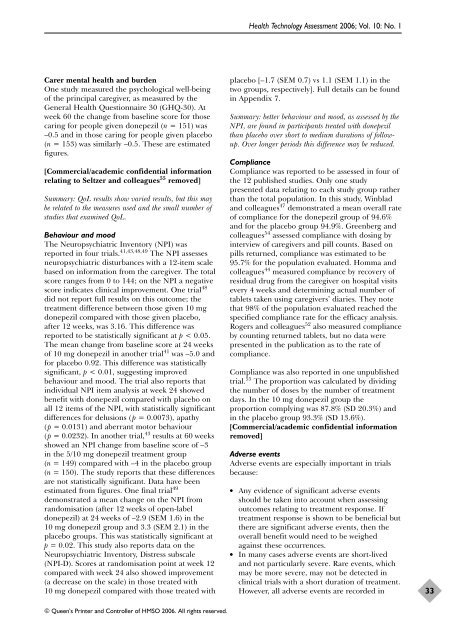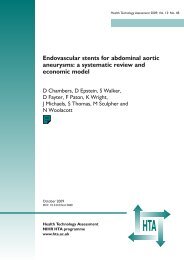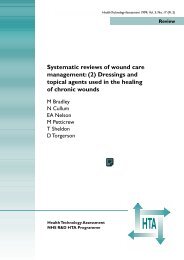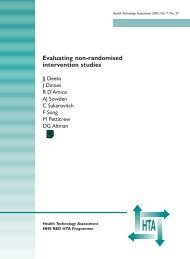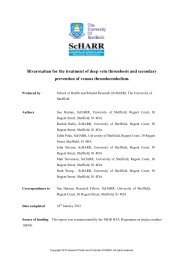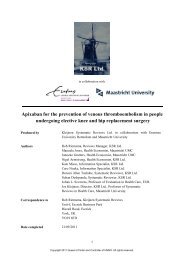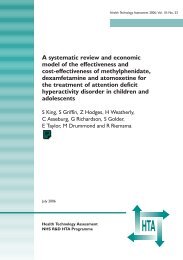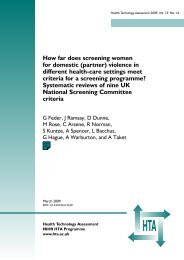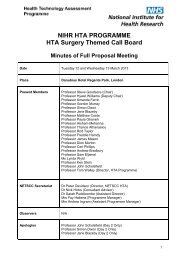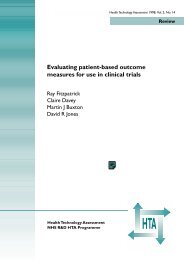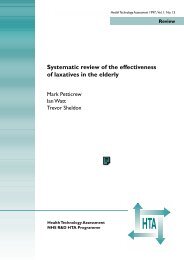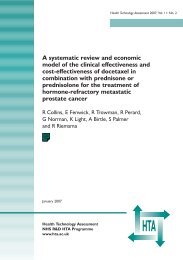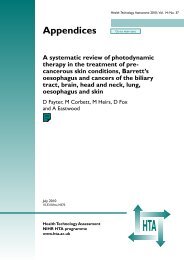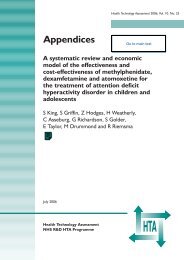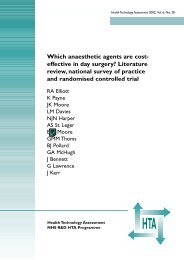Donepezil, rivastigmine, galantamine and memantine for ...
Donepezil, rivastigmine, galantamine and memantine for ...
Donepezil, rivastigmine, galantamine and memantine for ...
You also want an ePaper? Increase the reach of your titles
YUMPU automatically turns print PDFs into web optimized ePapers that Google loves.
Carer mental health <strong>and</strong> burden<br />
One study measured the psychological well-being<br />
of the principal caregiver, as measured by the<br />
General Health Questionnaire 30 (GHQ-30). At<br />
week 60 the change from baseline score <strong>for</strong> those<br />
caring <strong>for</strong> people given donepezil (n = 151) was<br />
–0.5 <strong>and</strong> in those caring <strong>for</strong> people given placebo<br />
(n = 153) was similarly –0.5. These are estimated<br />
figures.<br />
[Commercial/academic confidential in<strong>for</strong>mation<br />
relating to Seltzer <strong>and</strong> colleagues 55 removed]<br />
Summary: QoL results show varied results, but this may<br />
be related to the measures used <strong>and</strong> the small number of<br />
studies that examined QoL.<br />
Behaviour <strong>and</strong> mood<br />
The Neuropsychiatric Inventory (NPI) was<br />
reported in four trials. 41,43,48,49 The NPI assesses<br />
neuropsychiatric disturbances with a 12-item scale<br />
based on in<strong>for</strong>mation from the caregiver. The total<br />
score ranges from 0 to 144; on the NPI a negative<br />
score indicates clinical improvement. One trial 48<br />
did not report full results on this outcome; the<br />
treatment difference between those given 10 mg<br />
donepezil compared with those given placebo,<br />
after 12 weeks, was 3.16. This difference was<br />
reported to be statistically significant at p < 0.05.<br />
The mean change from baseline score at 24 weeks<br />
of 10 mg donepezil in another trial 41 was –5.0 <strong>and</strong><br />
<strong>for</strong> placebo 0.92. This difference was statistically<br />
significant, p < 0.01, suggesting improved<br />
behaviour <strong>and</strong> mood. The trial also reports that<br />
individual NPI item analysis at week 24 showed<br />
benefit with donepezil compared with placebo on<br />
all 12 items of the NPI, with statistically significant<br />
differences <strong>for</strong> delusions (p = 0.0073), apathy<br />
(p = 0.0131) <strong>and</strong> aberrant motor behaviour<br />
(p = 0.0232). In another trial, 43 results at 60 weeks<br />
showed an NPI change from baseline score of –3<br />
in the 5/10 mg donepezil treatment group<br />
(n = 149) compared with –4 in the placebo group<br />
(n = 150). The study reports that these differences<br />
are not statistically significant. Data have been<br />
estimated from figures. One final trial 49<br />
demonstrated a mean change on the NPI from<br />
r<strong>and</strong>omisation (after 12 weeks of open-label<br />
donepezil) at 24 weeks of –2.9 (SEM 1.6) in the<br />
10 mg donepezil group <strong>and</strong> 3.3 (SEM 2.1) in the<br />
placebo groups. This was statistically significant at<br />
p = 0.02. This study also reports data on the<br />
Neuropsychiatric Inventory, Distress subscale<br />
(NPI-D). Scores at r<strong>and</strong>omisation point at week 12<br />
compared with week 24 also showed improvement<br />
(a decrease on the scale) in those treated with<br />
10 mg donepezil compared with those treated with<br />
© Queen’s Printer <strong>and</strong> Controller of HMSO 2006. All rights reserved.<br />
Health Technology Assessment 2006; Vol. 10: No. 1<br />
placebo [–1.7 (SEM 0.7) vs 1.1 (SEM 1.1) in the<br />
two groups, respectively]. Full details can be found<br />
in Appendix 7.<br />
Summary: better behaviour <strong>and</strong> mood, as assessed by the<br />
NPI, are found in participants treated with donepezil<br />
than placebo over short to medium durations of followup.<br />
Over longer periods this difference may be reduced.<br />
Compliance<br />
Compliance was reported to be assessed in four of<br />
the 12 published studies. Only one study<br />
presented data relating to each study group rather<br />
than the total population. In this study, Winblad<br />
<strong>and</strong> colleagues 47 demonstrated a mean overall rate<br />
of compliance <strong>for</strong> the donepezil group of 94.6%<br />
<strong>and</strong> <strong>for</strong> the placebo group 94.9%. Greenberg <strong>and</strong><br />
colleagues 54 assessed compliance with dosing by<br />
interview of caregivers <strong>and</strong> pill counts. Based on<br />
pills returned, compliance was estimated to be<br />
95.7% <strong>for</strong> the population evaluated. Homma <strong>and</strong><br />
colleagues 44 measured compliance by recovery of<br />
residual drug from the caregiver on hospital visits<br />
every 4 weeks <strong>and</strong> determining actual number of<br />
tablets taken using caregivers’ diaries. They note<br />
that 98% of the population evaluated reached the<br />
specified compliance rate <strong>for</strong> the efficacy analysis.<br />
Rogers <strong>and</strong> colleagues 52 also measured compliance<br />
by counting returned tablets, but no data were<br />
presented in the publication as to the rate of<br />
compliance.<br />
Compliance was also reported in one unpublished<br />
trial. 55 The proportion was calculated by dividing<br />
the number of doses by the number of treatment<br />
days. In the 10 mg donepezil group the<br />
proportion complying was 87.8% (SD 20.3%) <strong>and</strong><br />
in the placebo group 93.3% (SD 13.6%).<br />
[Commercial/academic confidential in<strong>for</strong>mation<br />
removed]<br />
Adverse events<br />
Adverse events are especially important in trials<br />
because:<br />
● Any evidence of significant adverse events<br />
should be taken into account when assessing<br />
outcomes relating to treatment response. If<br />
treatment response is shown to be beneficial but<br />
there are significant adverse events, then the<br />
overall benefit would need to be weighed<br />
against these occurrences.<br />
● In many cases adverse events are short-lived<br />
<strong>and</strong> not particularly severe. Rare events, which<br />
may be more severe, may not be detected in<br />
clinical trials with a short duration of treatment.<br />
However, all adverse events are recorded in<br />
33


